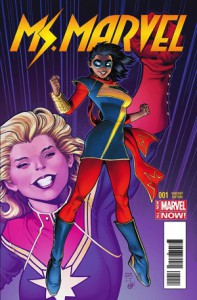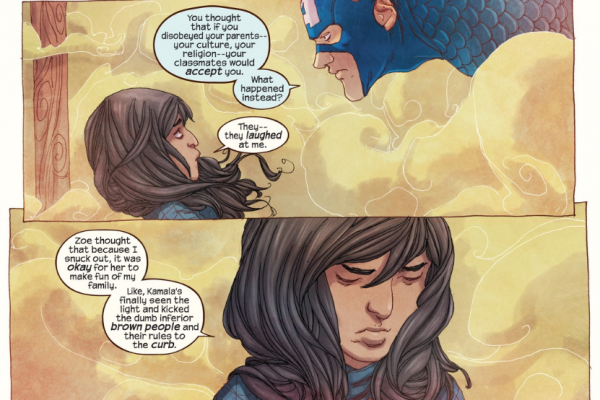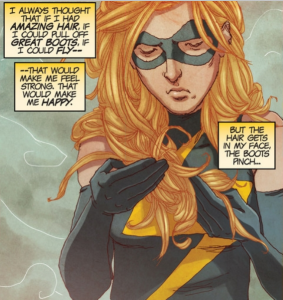Paging Ms. Marvel: The Perks & Perils of Creating an Islamic Feminist Superhero
By Rita Banerjee
The new Ms. Marvel comic series focuses on the trials and tribulations of Kamala Khan, a Muslim Pakistani-American high school student from Jersey City. The series is a reboot of the original Ms. Marvel comics made famous by the character of Carol Danvers, who debuted as Ms. Marvel in 1977 and eventually rose to become Captain Marvel in 2012. This new Ms. Marvel, written by G. Willow Wilson and inspired by the adolescence of Marvel Comics editor Sana Amanat, is full of surprises—from sly observations on cultural stereotypes to explorations of geek culture and the fan fiction–verse to redefining concepts of female beauty and empowerment. Or as Amanat writes at the end of the premiere issue of Ms. Marvel, “this book is a victory for all the misfits in the world,” as embodied in the “loveable, awkward, fiercely independent” Kamala. But in attempting to create an Islamic feminist superhero in the guise of an adorable and awkward teenager, Kamala Khan, the new Ms. Marvel has its fair share of both perks and perils.
In many ways, Ms. Marvel offers its readers something exciting, progressive, and new. Kamala Khan, who later transforms into Ms. Marvel, is the first major South Asian superhero protagonist in the Marvel comic book–verse. She actively engages with her cultural history, whether it is speaking to her mother in Urdu, quoting aphorisms and verses from the Qu’ran, or attending lectures for youth at the local mosque. Though her story is set in Jersey City and not New York City, the center of the Marvel—or American—cultural universe, it is still full of local color and features a diverse set of characters. This new version is peppered with references to characters of different cultural and religious backgrounds. Kamala’s close friends are Italian-American and Turkish-American, and on her way home from school, she frequently passes by the local Vietnamese grocery store. In interacting with her parents, Kamala’s story also explores issues of identity and immigrant narratives. And as Kamala tries to carve out an identity and explores her own adolescent rebellion against the cultural and gender expectations imposed upon her by her parents, friends, teachers, and mosque, she slowly begins to take charge of her own narrative and evolves into a new kind of feminist ideal.
However, despite the uniqueness of Kamala’s character and the agency she exhibits, one of the first perils that catch the reader’s eye is the way in which Ms. Marvel addresses issues of cultural marginalization and exclusion. Stereotypes are introduced and only at times dismantled.
For instance, the first issue of the new Ms. Marvel series opens with our protagonist, a teenaged, spunky, tech-savvy, comic book aficionado, sniffing at a row of all-American BLTs, wondering what bacon tastes like. Kiki, or Nakia as her Turkish Muslim-American friend now likes to be called, tells Kamala to either eat bacon or stick to her principles, and not linger in between.
It is Nakia who enunciates Kamala’s existential crisis here. But what are Kamala’s principles? Although she respects and makes reference to her Muslim upbringing and Urdu-speaking household, Kamala vacillates between adopting and rebelling against religious and social doctrines. In this scene, Nakia, who wears a headscarf, indirectly berates Kamala for half-heartedly embracing her Muslim identity. Her words and annoyance imply that Kamala is somehow not an authentic participant or active agent in her ethnic and religious community and at this moment stands on a figurative precipice. Will Kamala embrace her heritage and socio-religious identity, or will she choose to be an outsider? All this drama is caused by Kamala’s adolescent desire to take part in something she’s never experienced before and thus, might mark her as an outsider.
As the scene continues, we meet more of the supporting cast of characters, who embody a variety of emotional and social conflicts for Kamala. Bruno Carrelli is a shaggy Italian-American boy hopelessly crushing on Kamala, and who is in charge of the cash register at Q Circle where Kamala hangs out with Nakia before school starts. Kamala sees Bruno as an annoying older-brother figure cramping her style while Bruno sees Kamala as a woman he would love to chaperone and protect. Enter Zoe, cool girl extraordinaire, who is blonde, blue-eyed, and more than a little culturally dense. She interrupts the trio’s morning ritual by barging in with her equally Übermensch boyfriend, Josh, the stereotypical missing-a-corkscrew varsity jock.
Zoe announces herself by telling Bruno that she will have her usual, to which Bruno replies that he does not retrieve self-serve coffee for customers (and thus will not behave as Zoe’s servant). Zoe tells Bruno she’s worried about his financial welfare and will tip him, before brushing off his comment and inviting “Kiki” and Kamala to a party by the waterfront, an invitation she partially retracts when she realizes mid-statement that they will not be allowed to attend. But Zoe’s real zinger comes when she comments on Nakia’s headscarf. She loves the color but is worried that Nakia has to wear the scarf because it was forced upon her by her father, another man, or even by her religion. Zoe immediately sees the hijab as a symbol of sexual and social oppression and wonders if Nakia might face an honor killing if she takes it off. To this Nakia curtly replies, “Actually, my dad wants me to take it off. He thinks it’s just a phase.” And Zoe, clearly fascinated, says, “Really? Wow, cultures are so interesting.” She then ducks out with Josh, saying goodbye to both Kamala and Nakia, whom she calls by her full name this time.
What is fascinating about this scene is the way in which the protagonists and antagonists are defined. Zoe and Josh are blond, blue-eyed, stereotypically Aryan, and culturally unsophisticated. Zoe performs the role of the dysfunctional cultural ambassador as she superficially engages with Nakia and her religious-ethnic background without taking the time to fully understand it or to revise her own prejudiced notions. Yet while Zoe comes across as a jerk and Bruno states that he hates her after she leaves, Kamala sees some humanity in her. She tells Bruno that she thinks Zoe is nice, adorable, and happy, to which Nakia replies, “She’s only nice to be mean,” and later, “You are not allowed to defend Zoe Zimmer.” Herein lies the problem. Zoe and Josh, with their carefree personalities and Aryan good looks, are meant to serve as soft antagonists and cultural counterpoints to Kamala and her lot of marginalized misfits. But Zoe and Josh are as much a stereotype of cultural power, oppression, and mainstream American values as a hijab can be of Muslim culture, marginalization, and silencing.
In attempting to familiarize and make Kamala’s Muslim, Pakistani-American, Urdu-speaking identity a normative part of the American cultural sphere, the identities of non-“other” Americans, those who seem to hold positions of power and privilege or who represent the ideals of Hegelian and colonial beauty, are marginalized and reduced. Zoe, not caring to fine tune her understanding of Nakia’s headscarf, offhandedly states, “Wow, cultures are so interesting,” as if she herself has none. And that is a troubling point in the new Ms. Marvel comics.
While Zoe’s last name, Zimmer, is of Germanic origin and appears to indicate a Teutonic lineage, it can also suggest unacknowledged Jewish ancestry. Thus, in demonstrating Zoe and Josh’s position of privilege, ignorance, and non-intellectualism over Kamala and her lot, the story also hints at cultural erasure. If Zoe represents the American ideal but lacks culture, history, and nuance, what is Kamala getting herself into?
Losing one’s identity by worshipping at the altar of the bluest eye is further exacerbated by Kamala’s eventual transformation into Ms. Marvel. Kamala states, “[M]y chances of becoming an intergalactic superhero are even slimmer than my chances of becoming blond and popular.” Here she reveals one of her central concerns, that she can never fit into her school or her society because she is not popular, blonde, and blue-eyed.
Later, on Friday night, Kamala has a tense moment with her father when she asks if she can go to the waterfront party after dinner. He refuses, noting that there will be plenty of boys and alcohol there. Instead, he suggests that Kamala invite Nakia over so they can do their homework together and then watch movies. Kamala, being the rebellious adolescent that she is, complains loudly, telling her father that if she were a boy, she would have been allowed to go to the party. This response gets her grounded. Kamala then takes matters into her own hands and sneaks out of her second-story bedroom. She arrives at the boisterous, booze-laden party where Josh and his acne-faced friends make her drink some spiked punch. Bruno comes to her rescue, which prompts Zoe to tell her, “Ugh, Kamala, no offense, but you smell like curry, and I’m going to stand somewhere else.”
Bruno tries to steer Kamala out of the party, but she will have none of it. She sees Bruno as an extension of the conservative patriarchal rule she faces at home. As a teenager just coming into her own and searching for her own identity as well as her own independence, Kamala feels that Bruno, like her parents, treats her like a child.
Running away from both Bruno and the party, Kamala finds herself walking through the fog-laden streets of Jersey City. But there is something in the air. Kamala thinks that she is passing out because she’s drunk, but the green fog activates Kamala’s dormant “Inhumanity” genetic code, which links her to a league of superheroes.
Regaining consciousness, she hears the lyrics of a medieval Sufi song, “Phool Rahi Sarson Sakalban.” This song, originally composed in Hindustani by Amir Khushrow (1253–1325), a royal poet of the Delhi Sultanate, is being sung by none other than Carol Danvers, formerly of Ms. Marvel and now of Captain Marvel fame. Confused, Kamala asks Captain Marvel how she knows Urdu, to which she replies, “We are faith. We speak all languages of beauty and hardship.” The Avengers team then tries to educate Kamala in her drunken state. Captain America attempts to knock some sense into her. He notes that Kamala’s disobedience of her parents, culture, and religion only resulted in her getting mocked by her popular, “cool” classmates, Zoe and Josh.
In attempting to mold herself to the culturally hegemonic values of her more popular normative classmates, Kamala realizes that she is losing part of her identity and cultural specificity. Yet what is disturbing in this dialogue is the attitude of inherent racism and caste difference she projects onto Zoe. Kamala assumes Zoe’s snark at the waterfront party derives from her inherent disgust of the culture and values of “dumb inferior brown people”; however, Zoe herself never directly articulates a strong racist sentiment against Kamala and her friends. Zoe is an equal-opportunity ditz, to be certain. She treats every character she meets flippantly. And while she does behave like a princess, expecting all to bow down to her, she does not single out one culture or group of people as being grotesque, inferior, or radically other. But while she is insensitive and ignorant in her attempts to process the symbolism and cultural significance of Nakia’s headscarf, her curiosity to understand makes her inquire about it further. When Nakia in her irritation notes that she does not like to be called “Kiki,” a cutesy Americanized nickname that erases her cultural identity and Turkish Muslim heritage, Zoe calls Nakia by her given name. Thus, to project a hatred of the other or deliberate racist values onto Zoe seems unfair. She is just as adolescent and prone to mistakes and misunderstandings as Kamala. So why are Kamala’s stumbles with race, religion, and culture considered awkward but adorable, while Zoe’s actions considered malevolent? Does it have something to do with Zoe’s depiction as blonde-haired, blue-eyed, all-American girl, which places her at the epicenter of American social values of normativity and beauty, and thus, at the top of the American cultural caste system?
Moreover, why does Captain America reprimand Kamala for not obeying her parents, culture, and religion? If this new Ms. Marvel series is about a young teenage girl trying to carve out a place for herself, her own voice, and her own vision in the world, who gets to set the values she must abide by and why? Does not Captain America’s warning that Kamala must obey the values and custom of those around her automatically hinder her quest for self-exploration and her own individual agency? Can Kamala really rebel against her family, her heritage, or even mainstream American values if she is told that she should obey? What does this seemingly innocuous moral lesson delivered by the powerful and idolized Captain America tell us about Kamala’s own agency?
At the heart of this new series is Kamala’s existential crisis. When Captain Marvel asks what Kamala wants to be most of all, she replies that she wants to be Carol Danvers. But when she finally activates her “Inhuman” gene and transforms into Ms. Marvel, she realizes that she is an exact replica of Carol: blonde and blue-eyed with high-heeled boots to match. And as Kamala soon finds out, her black-leotard superhero costume does not come with any underwear. So there she is, the new savior of Jersey City, the all-American girl and sex kitten extraordinaire.
While she can save lives and fight danger as Ms. Marvel and, as a polymorph Inhuman, transform her body and size to fit any situation, the place where Kamala fits in the least is in her own skin. Back to her normal teenage self as a brown, Urdu-speaking Muslim girl, Kamala feels marginalized by her parents and community, who expect her to be docile and to behave. Her teachers and high school peers see her as just a goody-two-shoes, well-behaved class nerd.
As the comics progress, Kamala slowly begins to find her voice, and a sense of who she truly is or could be. When Kamala and Nakia attend a youth lecture at their local mosque in Jersey City, Kamala notes how she feels shut out from the conversation and lecture since she and the other ladies are required to sit behind a partition.
At the mosque, she questions gender inequality in her religious and social circumstances and expresses her own burgeoning feminist views. As Kamala continues to transform into Ms. Marvel, she grows increasingly uncomfortable in her superhero persona. As a polymorph, she finds that she can transform in size and appearance but cannot so readily change her identity as Ms. Marvel. She is still a replica of Carol Danvers, and with each transformation, she feels increasingly out of place in the façade of her newly assumed identity.
As the series progresses, Kamala slowly realizes that being the blonde, blue-eyed, sexpot version of a superhero is not all that it is cut out to be, but it is unclear if Kamala will be able to truly transform Ms. Marvel into her own mold. As Kamala fights her own biases and the biases of those around her, several questions arise. Is America really ready for its first Islamic feminist Pakistani-American superhero? Will Kamala’s audience accept her without her blonde and blue-eyed disguise?
As Sana Amanat says in her closing comments, this new Ms. Marvel “reflects the changing face of America,” and while Amanat argues that this new comic is not meant to have a political agenda, by employing a character belonging to an ethnic and religious minority (and a woman to boot) Kamala’s journey of self-discovery and her narrative becomes inherently political. And as Kamala slowly begins to embrace her role in the changing face of America, the question remains: will we as an audience be able to change our expectations and biases with her? And if so, what will become of those cultural stereotypes, gender assumptions, ready-made institutions, and symbols of power and beauty that we had considered cherished and true for so long?
![]()
 Rita Banerjee received her PhD in Comparative Literature from Harvard and teaches modern South Asian literatures, Bengali language, and art house film at LMU in Munich. She is author of Cracklers at Night and A Night with Kali, and her creative work has been featured in VIDA: Women in Literary Arts, The Fiction Project, Catamaran, Amethyst Arsenic, and the new renaissance.
Rita Banerjee received her PhD in Comparative Literature from Harvard and teaches modern South Asian literatures, Bengali language, and art house film at LMU in Munich. She is author of Cracklers at Night and A Night with Kali, and her creative work has been featured in VIDA: Women in Literary Arts, The Fiction Project, Catamaran, Amethyst Arsenic, and the new renaissance.








Hi there Ms Rita! Enjoyed your article; thanks for such a thoughtful and thorough look at the first volume of Ms. Marvel. Have you read further issues?
Zoe and Josh become two of the best, most interesting, most complicated characters in the entire series. That’s the whole point of why Ms Marvel rocks so hard. You think you know the characters based on how they look or act, but they prove so much more.
You write: “Zoe and Josh, with their carefree personalities and Aryan good looks, are meant to serve as soft antagonists and cultural counterpoints to Kamala and her lot of marginalized misfits.”
But, as the series progresses, Zoe and Josh both try to join Kamala and her band of marginalized misfits. Both have secrets. Both sincerely want to become better people, better friends.
Zoe pretty much succeeds. Josh tries and succeeds and fails and tries again. The story of Josh (and how Kamala’s group embraces him, but can’t let go of their stereotypes surrounding him) is one of the most poignant in the entire series. Read through Volume 8 (Mecca) and you’ll see what I mean.
Cheers!